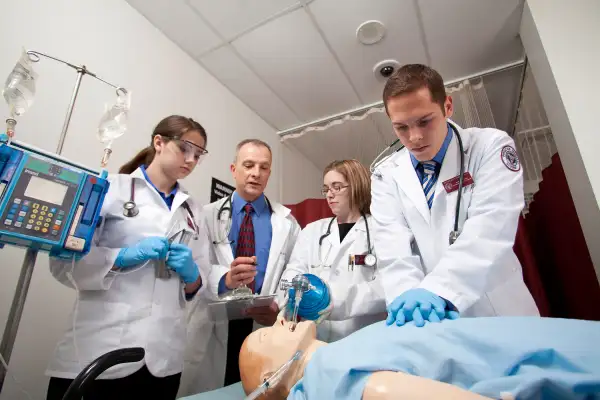10 Colleges Whose Graduates Say They Make the World a Better Place

An elite college degree may give you better odds of a big paycheck, but it won't necessarily lead to a job that feeds your soul, new survey results indicate.
Instead, a just-released PayScale.com survey finds the schools that produce alumni who believe they are changing the world for the better tend to be ones that educate people for the helping professions, such as nurses and teachers, and offer opportunities to disadvantaged students.
Overall, 54% of all alumni told the website that their “job makes the world a better place."
The job meaning numbers are important because other research shows that a career spent helping people is one of the most important factors in overall life happiness. A growing body of research confirms the old adage that money doesn’t buy happiness, says John Helliwell, a researcher with the University of British Columbia and co-editor of the United Nations-sponsored “World Happiness Report.”
“People may think they are after a paycheck and title. But what really turns their crank at the end of the day is the feeling that they've been working together with other people to help other people,” he says.
(Money uses PayScale's job meaning data as one of the factors in our college rankings.)
Perhaps not surprisingly, Katie Bardaro, PayScale's vice president of data analytics, says her organization's surveys find people who report their jobs are meaningful are also far more likely to be happy in them.
So which schools have the alumni with the most meaningful jobs?
Most of the schools with the highest job meaning scores in PayScale’s new survey focus on educating health professionals. Bardaro says other PayScale research has found that clergy generally report the highest levels of job meaning, but graduates who go into other helping professions such as teaching, social work, and counseling also feel they help people in their work.
Schools that focus on providing opportunity to disadvantaged students also had generally high scores. Fully 64% of alumni of historically black colleges and universities (HBCUs) felt they were making the world a better place. One standout: South Carolina State University, where 76% of alumni said that.
(Find the Best Colleges for African-Americans.)
And three large public universities reported job meaning scores above 70: the University of Texas at Brownsville, University of Texas-Pan American, and the University of Alabama at Birmingham.
Alumni of the elite colleges reported about the same job meaning as the average.
Middlebury College had the highest score among the elites, with 76% of its alumni reported high job meaning.
Many of the colleges on the list are not ranked by Money because they are small specialty schools for health professionals or have lower than average graduation rates. These are the 10 highest scorers.
| College | Avg. early career earnings | Alumni with high job meaning | Grads with degrees in health |
|---|---|---|---|
| University of Nebraska Medical Center | $50,600 | 91% | 100% |
| Texas Wesleyan University | $34,900 | 90% | 2% |
| University of Texas-Medical Branch | $58,400 | 85% | 100% |
| Loma Linda University | $68,500 | 84% | 100% |
| Thomas Jefferson University | $58,900 | 83% | 99% |
| The University of Texas Health Science Center at San Antonio | $52,700 | 82% | 100% |
| Springfield College | $35,200 | 81% | 33% |
| University of Arkansas for Medical Sciences | $46,200 | 79% | 100% |
| Armstrong State University | $44,100 | 79% | 44% |
| National Louis University | $44,100 | 77% | 6% |
